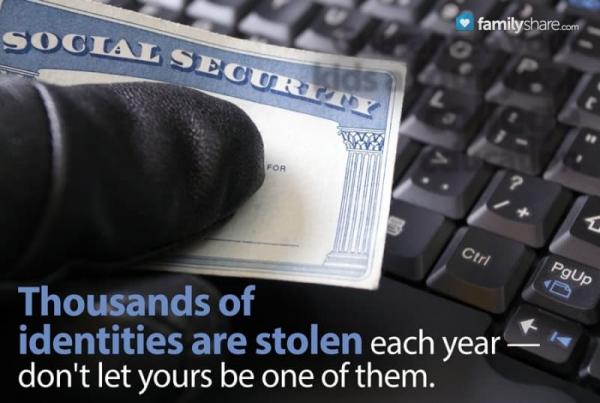
Identity theft is the unauthorized use or attempted use of credit cards, other accounts such as checking accounts, and the misuse of personal information - such as a Social Security number - to obtain new accounts or commit crimes. The Federal Trade Commission (FTC) in the U.S. estimates that around 9 million Americans have their identity stolen each year, with government documents and benefits fraud as the most common reported identity theft, followed by credit card fraud.
A person may not ever find out they have been a victim until they notice charges on a credit card statement or are contacted by a debt collector. Identity theft has a potential loss of thousands of dollars and can cause thousands of hours of time just trying to repair the damage.
How is an identity stolen?
Dumpster diving
- thieves love to rummage through trash (yours or a business you have frequented) to obtain receipts or other personal information that has been discarded.
Phishing
- this is when a criminal pretends to be a legal institution and attempts to get personal information from you.
Changing your address
- the thief may remove mail from your mailbox outside of your home or your dumpster or send in a change of address form to the post office in an attempt to re-route your mail to another location.
Stealing your wallet or purse
- old fashioned but it works.
Signs of identity theft
According to the FTC's Consumer Information website, the following are some warning bells that you may have become a victim of identity theft:
-
You stop getting bills or other mail.
-
Merchants refuse your checks.
-
You find unfamiliar accounts or charges on your credit report.
-
Medical providers bill you for services you didn't use.
-
Your health plan rejects a medical claim based on records that show you've reached your benefits limit or denies coverage based on a condition your medical records show you know you don't have.
Steps to prevent identity theft
-
Keep an eye on all of your financial transactions and records including credit card statements. Look for charges that you did not make.
-
Be cautious with email and embedded links. Never open an email or a link from someone you don't know or if it looks suspicious from someone you do know. Email accounts are hacked daily and malware is sent using your friends' accounts.
-
Never click on a link from the body of an email from any institution, even if it is one you do regular business with. Open a new window and access the institution's website by typing the address directly.
-
Shred all documents with personal or sensitive information on them - both paper and electronic.
-
Keep your security software up to date and be aware of the latest scams and viruses. Keep family and friends up to date as well. Two good U.S. websites for this are USA.gov (consumer frauds and scams page) and fbi.gov (new E-scams and warnings page).
-
Carry only essential documents with you.
-
Avoid giving out personal information over the phone unless you initiated the call.
-
Pick up new checks at the bank rather than having them sent via the mail.
-
Use passwords with a mix of numbers and letters. Change them often especially if you have been traveling. Avoid accessing personal accounts, especially financial accounts, when traveling or in a public place such as an Internet café.
Get a free credit report
Any delinquent accounts are reported to your credit report. When identity thieves use your personal information to open an account and then not pay the bill, this shows up on the credit score, affecting your ability to get a job or loans.
In the U.S. there are three nationwide consumer reporting agencies - Equifax, Experian, and TransUnion. Through the Fair Credit Reporting Act (FCRA) each of these companies are required by law to provide consumers with a free copy of their credit report - at the consumer's request - once every 12 months. Financial advisors suggest staggering your credit reports among the three institutions during the 12 month period, thus keeping on top of any illegal activity of your credit every four months.
Rather than contacting these consumer reporting agencies individually, they have a central website to order a free report - annualcreditreport.com. This is the ONLY website that is authorized to fill orders for the free annual credit report you are entitled to under law. Any others indicating this may be fraudulent. You can also call 1-877-322-8228 or complete an Annual Credit Report Request Form, mailing it to: Annual Credit Report Request Service, P.O. Box 105281, Atlanta, GA 30348-5281.
The best deterrent to any theft is awareness of your surroundings, and caution with personal or financial information. Many identities are stolen each year but yours doesn't have to be one of them.

